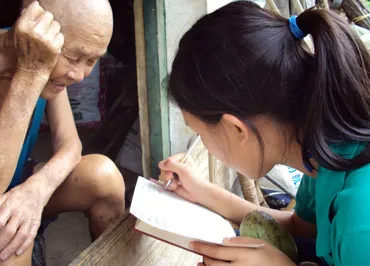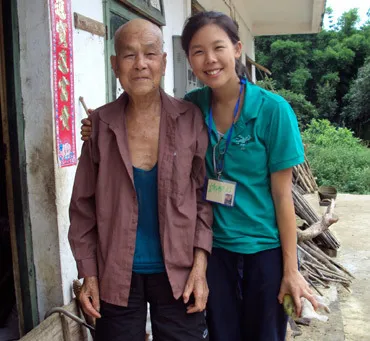Stephanie Chia '13: My Summer Learning About Social Action

Most of the villagers where Stephanie worked, such as He Bo (left), are fluent in Cantonese; Stephanie can speak and understand Mandarin. To communicate, the Chinese written language worked best as it is consistent between the two dialects.
Stephanie Chia '13, a biology major from Pleasantville, N.Y. with pre-med interests, and Collin Smith '14, a political science major with two years of Mandarin study at Swarthmore, spent their summer volunteering with Joy in Action (JIA), which works to promote the well-being of post-Hansen's disease (leprosy) villagers in central and southwest China. Each year, Global Neighbors, a Swarthmore student group which engages locally with the Children and Adult Disability and Educational Services school in Swarthmore, Pa., chooses two summer volunteers from its pool of applicants to help service the villages. Stephanie shares her story below.
Upon first entering the Hansen's disease recovery villages, I was worried that I would not be useful. I quickly learned that I was limited in my approach and understanding of what it means to be a volunteer. We gave to the villagers by fixing their roads and roofs which helped to improve their living conditions. But to the villagers, the most valuable gift that we gave was our presence and conversation. Many of the villagers are lonely, as they are unable to return home or reintegrate into society due to the heavy stigmatization of Hansen's disease. I also realized that the most common and important lesson we learned as volunteers is that the villagers often give much more to us than we give to them.

He Bo (left) and Stephanie outside He Bo's room.
Hansen's disease is a bacterial disease that primarily affects one's skin, eyes, and nervous system. As the infection progresses, sores appear on an individual's skin, leading to deformities. Those with Hansen's disease are often feared and ostracized because of these physical disfigurements. There are an estimated 100,000 people living with the after effects of Hansen's disease in China, many of whom reside in recovery villages – former quarantine villages that were established by the Chinese government in the 1950s.
Most of the villagers have lived the majority of their lives isolated in these villages. While many are cured of the disease, the physical scars left behind by the disease remain. The villagers were often missing legs, fingers, and toes, or were blind. Though these villagers have endured some of the worst treatment and have been challenged with a disabling disease, they still managed to show incredible compassion and concern for others. I was humbled by them and I felt lucky to have been able to meet and learn from them.
If we were able to earn their confidence, the villagers, most of whom were in their mid-60s and 70s, entrusted us with the sensitive stories of their pasts. By being endowed with their stories, we volunteers become a legacy of them and the suffering that they endured. But we also memorialize the perseverance and strength that they have shown. In this way, we can become a living memory of them and the impacts that they have had on our lives. Their stories are some of the most precious things that I own.
Through this summer experience I gained a greater understanding of what I would like to do in the future. I would like to be more involved with social action. This experience also reinforced my desire to study medicine. I hope going to medical school will afford me the tools I need to better contribute to projects like JIA.
Stephanie was one of 28 students granted a Summer Social Action Award (S2A2) through the Swarthmore Foundation. Administered by the Lang Center for Civic and Social Responsibility, the Swarthmore Foundation provides support to Swarthmore community members engaged in social action projects. Through the new Summer Internship Support grant, an additional 37 students, including Collin, received funding assistance for travel and living expenses. As Global Neighbors members, Stephanie and Collin received further support from The Project Pericles Fund of Swarthmore College, which assists teams of two or more students working on projects that are visionary in scope and groundbreaking in practice. In all, awarded students served more than eight topical areas of concern, such as education, sustainability, and the arts, in locations ranging from Chester to China.



